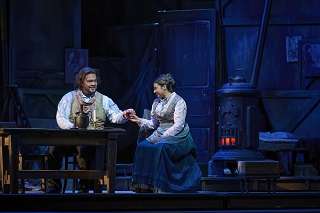|
Back
The Amazing Samoan and the Magnificent Egyptian Toronto
Four Seasons Centre for the Performing Arts
10/06/2023 - & October 8, 11, 13, 19, 21, 22, 28, 2023
Giacomo Puccini: La Bohème
Amina Edris*/Jonelle Sills (Mimì), Charlotte Siegel (Musetta), Pene Pati*/Kang Wang (Rodolfo), Joo Won Kang (Marcello), Blaise Malaba (Colline), Just Welsh (Schaunard), Gregory Dahl (Benoît, Alcindoro), Wesley Harrison (Parpignol), Korin Thomas‑Smith (Customs Officer), Gene Wu (Sergeant)
Canadian Opera Company Chorus, Sandra Horst (chorus master), Canadian Opera Company Orchestra, Jordan de Souza (conductor)
John Caird (original director), Katherine M. Carter (revival director), David Farley (set and costume designer), Michael James Clark (lighting designer), Michael James Clark (revival lighting designer)

P. Pati, A. Edris (© Michael Cooper)
This is the second revival by the Canadian Opera Company of this production, which was initially mounted in 2013. The effective sets for the bohemians’ mansarde feature several of Marcello’s paintings. Unfortunately, the paintings are rather drab, rendering the young men’s abode more depressing than usual. However, the dark hues of the paintings make the lighting effects more striking at crucial moments such as Mimì and Rodolfo’s initial encounter in Act I, as well as Mimì’s death in Act IV. The lighting was too dim during the moving scene when the two leads were searching for Mimì’s key. No wonder Mimì couldn’t see it!
The sets for Café Momus were convincing, not opulent as in some famous productions, but credible for the period, and believable as a place young bohemians could afford to frequent. The street scene was delightful, but mercifully not excessive. The crowd was well-coordinated, invoking a realistic atmosphere. After all, La Bohème is Puccini’s quintessential verismo opera. The Act III sets for the area known as La porte de l’Enfer (around the Customs House at one of Paris’s gates) were convincing without being austere. Act IV, the most challenging to stage, was effective thanks to a brilliant cast and imaginatively evocative lighting.
One couldn’t have hoped for a more appealing pair of lovers than Pene Pati and Amina Edris. The Samoan-born Pati possesses one of the most beautiful tenor voices I’ve heard in years. Egyptian-born Amina Edris’ lush lyric soprano is a joy, with warm timbre and natural trills. Unsurprisingly, they’re also a couple in real life, no doubt explaining how their chemistry is so intoxicating. The pair positively exude charisma, and Pati’s charm is life-affirming. Both are such convincing actors that it’s hard to take one’s eyes off them. The Act I sequence of “Che gelida manina”, “Sì, mi chiamano Mimì” and “O soave fanciulla” were moments of pure bliss.
Mimì and Rodolfo are so pivotal in La Bohème that one could forget the rest of the cast. But happily, there were several additional performances to enjoy, varying from good to outstanding. Joo Won Kang made an impression as the painter Marcello. Endowed with a warm and virile baritone, he was convincing, thanks to his excellent acting and stage presence. Charlotte Siegel was vocally miscast as Musetta. Though she’s an excellent actress, one would have liked a lighter soubrette soprano to better contrast with Mimì. She excelled in Musetta’s antics–temper tantrums, breaking dishes and most of all being coy and coquettish. She was compelling in Act IV when she brought Mimì to die with Rodolfo next to her.
Of the smaller roles, the Congolese bass Blaise Malaba was remarkable as the philosopher Colline. He was persuasive in “Vecchia zimarra”, a farewell ode to his long‑worn winter coat that he sold in order to buy Mimì’s medicine. His deeply resonant bass was as appealing as his Italian diction. Justin Welsh was an effervescent Schaunard, the musician among the young bohemians. His narration of the English nobleman who dared him to kill his parrot with his violin-playing was spirited. Baritone Gregory Dahl was both the landlord Benoît in Act I and the old fool Alcindoro, Musetta’s sugar daddy in Act II. He showed an unexpected affinity for comic verve, especially as Benoît, without being excessive.
Thanks to the exceptional leads and the effective staging, the opera was easy to enjoy, unfolding with a winning rhythm. Rivaled only by the lovers’ initial encounter in Act I, the Act III quartet was the evening’s high point. Conductor Jordan de Souza, ever attentive to his singers’ needs, managed to bring out the great lyricism of this quartet. The contrast between Musetta and Marcello’s bickering and Mimì and Rodolfo’s more gentle, loving break‑up was well-conveyed and made emotionally powerful thanks to the four soloists’ excellent acting. Mimì’s death scene was poignant thanks to Edris’s sober acting. More than half the faces I could see from my seat were tearing up. Though one can find one’s self blasé at this over-performed work, it’s hard not to surrender to Puccini’s music, especially with such an excellent cast. Therein lies its longevity.
Ossama el Naggar
|